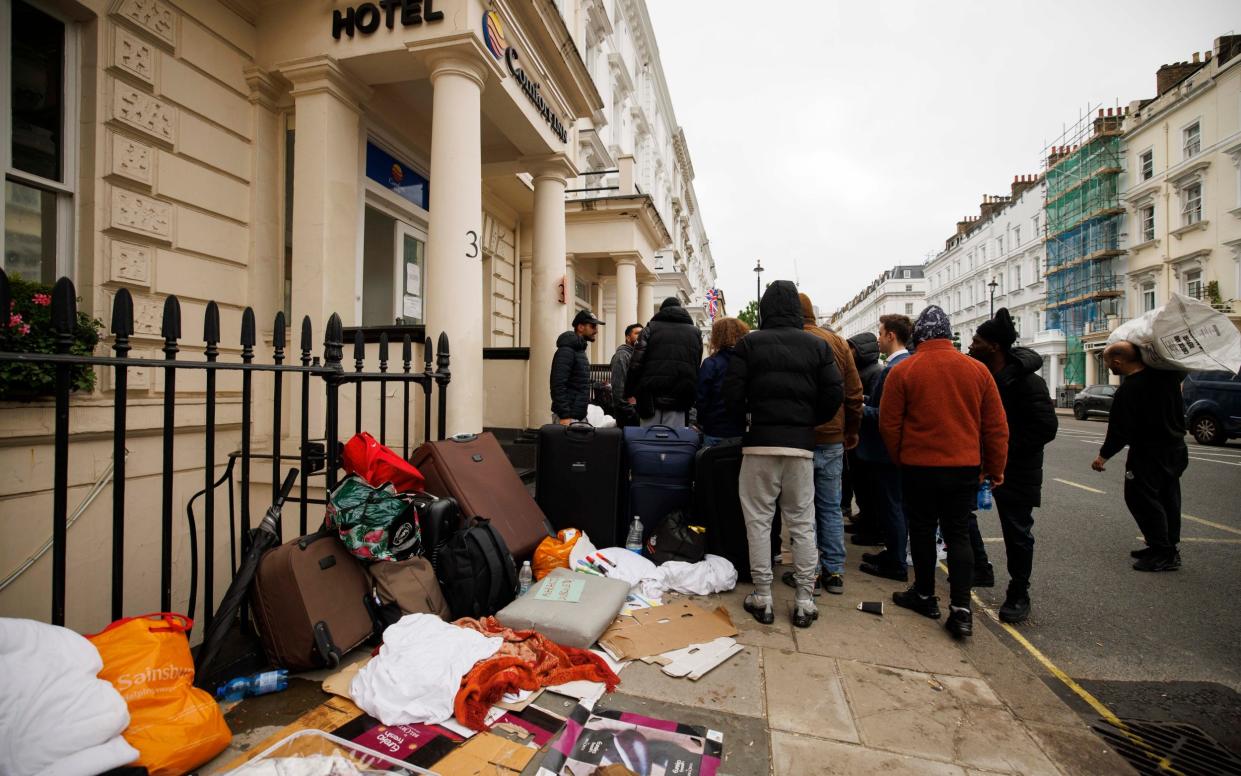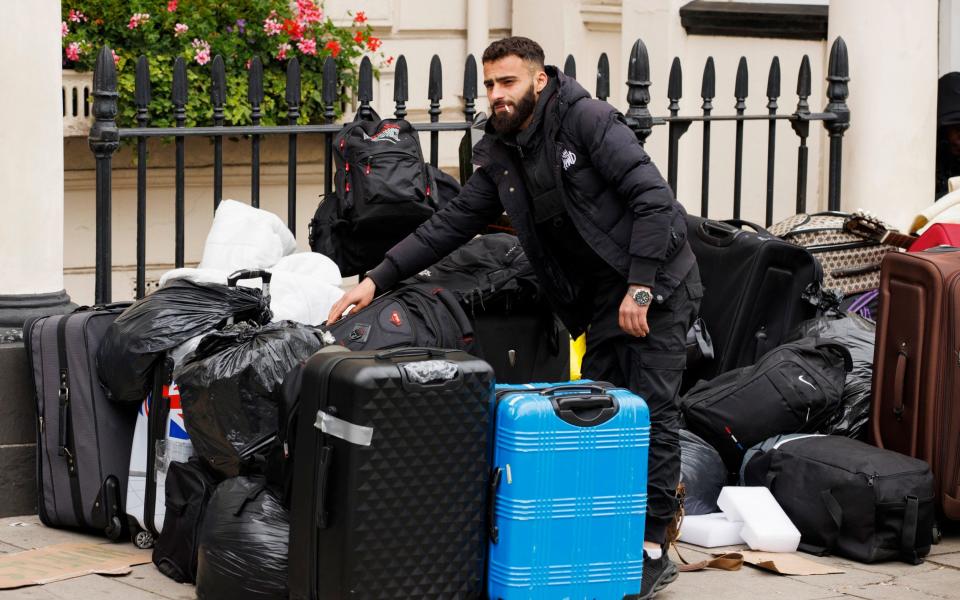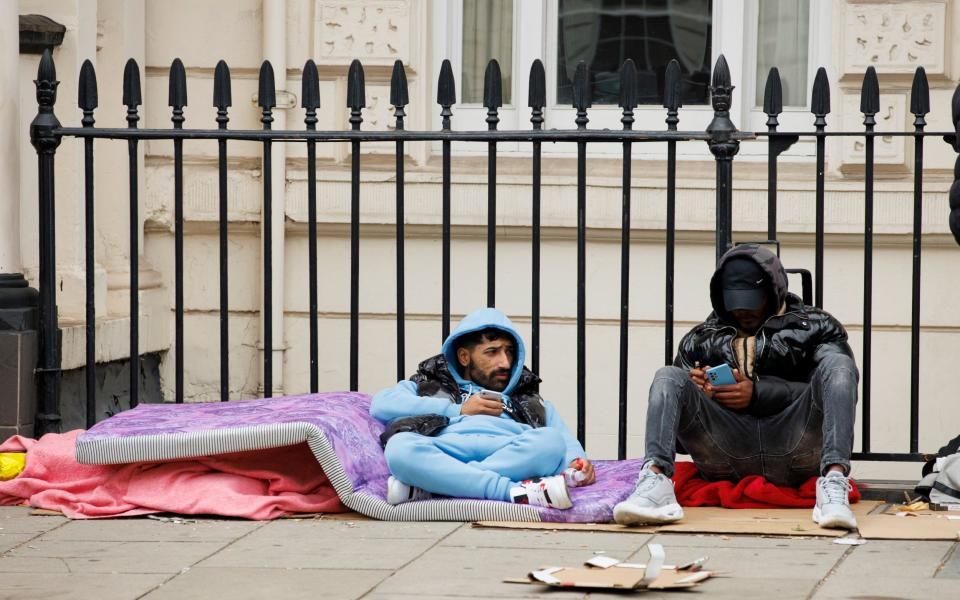Migrants barricade London hotel after being denied private rooms

Migrants are staging a pavement protest after deciding the hotel they have been transferred to was nothing like the “nice” accommodation they saw on Google Maps.
Instead of the single rooms with en suite bathrooms that they had in their Essex hotel, they found they were being forced to share – four to a single room with two bunk beds and a “smelly” toilet – in a hotel in central London.
On Thursday, the 25 migrants refused to return to their rooms in the Comfort Inn in Pimlico and instead decamped to the pavement. They say they will sleep there with their blankets, duvets, cushions and suitcases until they get single rooms.
A 27-year-old Iranian said: “Two square metres is not enough for sleeping four people. And when you go to the toilet, the smell damages you.”

A 21-year-old Channel migrant from Iran said: “They said we’re going to move you [from Park Hotel] to another, better place. They gave us this postcode. When we checked on Google Maps, we said, oh this is very nice. But when you get in, it’s like a jail. And they treat you very, very bad. They treat you like an animal.
“We didn’t come to a better life. We came to save our lives. If the Iranian government take me, they’re going to hang me because I fought for freedom. I’m Kurdish. Too many people in my family, too many people in my nationality, they’re hanged.”
“We’ll stay [on the street] until the Home Office does something for us. We can stay even for one month. It’s alright.”
A 26-year-old from east Africa who crossed the Channel on a small boat said they had been given private rooms in their hotel in Ilford. “We are not kids, everybody had a private room. We need a private room. How do you live with four men?” he said.
Last night the migrants – most of whom said they had been in Britain for more than a year – barricaded the entrance to the Pimlico hotel with their bags and suitcases, and used a marker pen as an improvised bolt to “lock” the front door.

The migrants – from Iraq, Iran, Eritrea, Ethiopia, Somalia and Bangladesh – have stuck protest posters at the hotel entrance and on traffic lights that declare: “Help us,” “This is a prison, not a hotel,” “Inhuman conditions, dirty rooms” and “Homeless by the Home Office”.
Their transfer is part of an attempt by the Home Office to reduce the £6 million-a-day cost of housing some 50,000 asylum seekers in hotels.
Ministers are understood to be pressing for increased use of shared rooms amid concerns that people smuggling gangs are exploiting the lure of hotel accommodation and a chance to see London’s tourist attractions.
Asylum seekers housed in hotels are free to come and go and receive £45 a week, or £9.10 a week if they get bed and board. Some 400 hotels have been commissioned to date, causing controversy, as some have been four-star country estates or the main tourist hotels in city centres.
“We are trying to drive down the costs and number of hotels by various mechanisms,” said a government source. “You see on TikTok, you get the people smugglers saying you will get your own hotel place and you get the sights.
“We are trying to cut down on the costs. If they say they don’t want to go to the accommodation that they are offered, we can withdraw support.”

Sources said the migrants had mixed accommodation in Essex with some in single rooms and some sharing.
The protest has sparked a backlash from other local hoteliers who say that it has led to tourists cancelling bookings and is disrupting the lives of local residents.
Bernard Desira, the director of the nearby Luna Simone Hotel, said he had had two cancellations because people were “scared” to come to the area. “It’s not fair for the tourists seeing what’s happening there,” he said, but added that housing four migrants to a room was “unfair and unhealthy”.
In an attempt to reduce hotel costs, ministers have so far drawn up plans to house migrants in two disused RAF camps, a former prison site, army barracks and a barge, but face legal action over most of the schemes.
A Home Office spokesman said the accommodation offered to asylum seekers on a no choice basis was “of a decent standard and meets all legal and contractual requirements”.
Mark Davies, Head of Communications and Campaigns at the Refugee Council, said: “It’s important that men, women and children who have fled war and persecution can access safe, dignified and secure accommodation while in the UK asylum system.
“But instead of providing refugees and people seeking asylum with appropriate support and access to suitable housing, the Government continues to accommodate an increasing number of people seeking asylum in places that are entirely unsuitable to their needs, such as crowded hotels, where they have to share rooms with people they don’t know for extended periods of time and are unable to put down roots and thrive in their new communities.”
The Comfort Inn declined to comment.

 Yahoo News
Yahoo News 
